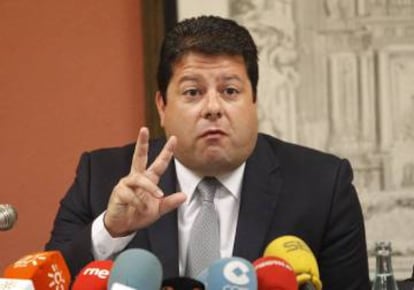No EU-UK deal will apply to Gibraltar without agreement from Spain
European guidelines to the Brexit negotiations back Spanish demands for two-way talks with London
On Friday, Brussels sent the European Union’s 27 remaining member states a nine-page document containing the guidelines to the Brexit negotiation that is opening up. These guidelines represent backing for Spain in its conflict over Gibraltar.

A clause in the document states that once the UK leaves the bloc, “no agreement between the EU and the United Kingdom may apply to the territory of Gibraltar without agreement between the Kingdom of Spain and the United Kingdom.”
The principle that the British overseas territory will be left out of any understanding between Europe and Britain is handing the Spanish government the negotiating key it needed in its claims over the territory. If London wants to facilitate any kind of relationship between Gibraltar and the EU27 members, it will have to agree to a bilateral negotiation with Madrid.
With Brexit, there is an opportunity to negotiate with Britain on Gibraltar from a very good starting point Ramón Jáuregui, Socialist MEP
It is unclear whether the British executive will accept, since London has always been wary of two-way talks.
Ever since the Brexit victory, the Spanish executive has invested a great deal of diplomatic effort into this project. And with Britain on its way out, the heads of state and government of the remaining 27 states are now openly defending Spain’s interests.
“In the EU of the 27, only the argument of one of the sides is now represented,” said one high-ranking European official.
Cooperating back home

Meanwhile, leaders of three of Spain’s main parties have met with high-ranking foreign ministry officials to hammer out a joint strategy aimed at starting a new kind of post-Brexit negotiation with Britain over the disputed territory of Gibraltar.
Representatives of the ruling Popular Party (PP), the main opposition Socialist Party (PSOE) and the small reform party Ciudadanos showed optimism about “a first good sign,” alluding to the fact that British Prime Minister Theresa May’s letter formally announcing the beginning of the UK’s separation from Europe did not include any mention of the overseas territory.
Gone are the days when former Spanish Foreign Minister José Manuel García Margallo boasted that “the Spanish flag will fly [in Gibraltar] much sooner than [Chief Minister] Fabian Picardo thinks.” Nor is there any more talk of co-sovereignty – one of the options defended by Spain in the past.
Instead, Spanish politicians are now trying to make the most of what they see as a historic opportunity afforded by Brexit. As a British overseas territory, The Rock will leave the EU when Britain does, even though 95% of Gibraltarians voted to remain at the referendum last year.
There no more talk of UK and Spanish co-sovereignty for Gibraltar – an option defended by Spain in the past.
Ever since, there has been a flurry of diplomatic and political activity with regard to a small territory of under seven square kilometers that shares its northern border with the Andalusian province of Cádiz. Gibraltar has been a source of dispute ever since it was ceded to Great Britain in 1713 under the Treaty of Utrecht.
“Now, with Brexit, there is an opportunity to negotiate with Britain from a very good starting point, in a very reasonable and bilateral manner, over one of the most delicate subjects for Spain, Gibraltar, while keeping this issue separate from other special borders such as Northern Ireland,” said Ramón Jáuregui, the PSOE representative in the European Parliament.
Esteban González Pons, of the European People’s Party (EPP), said he thinks it is “very relevant” that Theresa May did not mention Gibraltar in her letter to the EU. In his view, she did not “because Gibraltar is not part of Britain; it is a colony just like the island of Saint Helena.”
Other EPP sources close to the Spanish government said that “this absence is a good sign because it heralds good news: that Gibraltar is a matter to be negotiated bilaterally in future between Spain and Britain exclusively.”
English version by Susana Urra.
Tu suscripción se está usando en otro dispositivo
¿Quieres añadir otro usuario a tu suscripción?
Si continúas leyendo en este dispositivo, no se podrá leer en el otro.
FlechaTu suscripción se está usando en otro dispositivo y solo puedes acceder a EL PAÍS desde un dispositivo a la vez.
Si quieres compartir tu cuenta, cambia tu suscripción a la modalidad Premium, así podrás añadir otro usuario. Cada uno accederá con su propia cuenta de email, lo que os permitirá personalizar vuestra experiencia en EL PAÍS.
¿Tienes una suscripción de empresa? Accede aquí para contratar más cuentas.
En el caso de no saber quién está usando tu cuenta, te recomendamos cambiar tu contraseña aquí.
Si decides continuar compartiendo tu cuenta, este mensaje se mostrará en tu dispositivo y en el de la otra persona que está usando tu cuenta de forma indefinida, afectando a tu experiencia de lectura. Puedes consultar aquí los términos y condiciones de la suscripción digital.








































